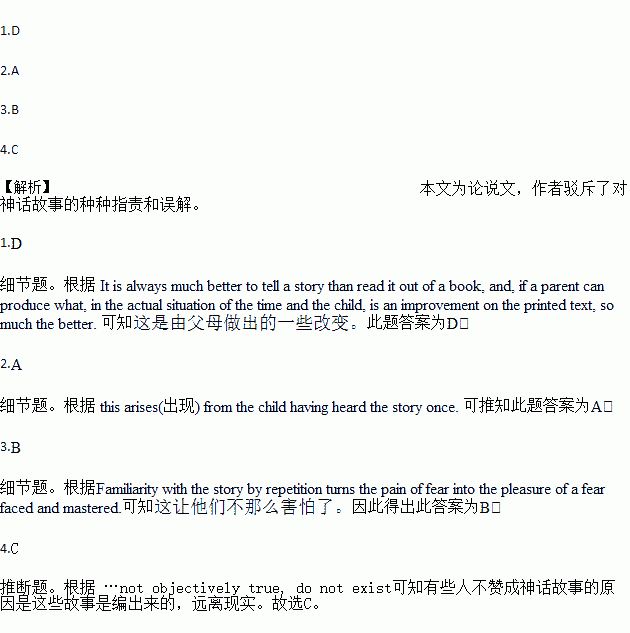题目内容
A child who has once been pleased with a tale likes,as a rule,to have it retold in almost the same words,but this should not lead parents to treat printed fairy stories as formal texts.It is always much better to tell a story than read it out of a book,and,if a parent can produce what,in the actual situation of the time and the child,is an improvement on the printed-text,so much the better.
A charge made against fairy tales is that they harm the child by frightening him or making him sad thinking.To prove the latter,one would have to show in a controlled experiment that children who have read fairy stories were more often sorry for cruelty than those who had not.As to fears,there are,I think,some cases of children being dangerously terrified by some fairy story.Often,however,this arises from the child having heard the story once. Familiarity with the story by repetition turns the pain of fear into the pleasure of a fear faced and mastered.
There are also people who object to fairy stories on the grounds that they are not objectively true,that giants, witches(女巫),two-headed dragons,magic carpets,etc.do not exist;and that,instead of being fond of the strange side in fairy tales,the child should be taught to learn the reality by studying history.If I find such people,I must say so strange that I do not know how to argue with them.If their cases were reasonable,the world should be full of mad men attempting to fly from New York to Philadelphia on a stick or covering a telephone with kisses in the belief that it was their beloved girl-friend.
No fairy story ever declared to be a description of the real world and no clever child has ever believed that it was.
1.In the author's opinion,when is a fairy story more effective?
A. It is treated as a joke.
B. It is set in the present.
C. It is repeated without any change.
D. It is made some changes by the parent.
2.According to the passage,great fear can take place in a child when the story is .
A. heard for the first time B. in a realistic setting
C. repeated too often D. told in a different way
3.What advantage does repeating fairy stories to young children bring?
A. It develops their power of memory.
B. It makes them less fearful.
C. It encourages them not to have strange beliefs.
D. It makes them believe there is nothing to be afraid of.
4.Which is one of the reasons why some people are not in favor of fairy tales?
A. Fairy tales are not interesting.
B. Fairy tales are full of imagination.
C. Fairy tales just make up the stories which are far from the truth.
D. Fairy tales make teachers of history difficult to teach.

